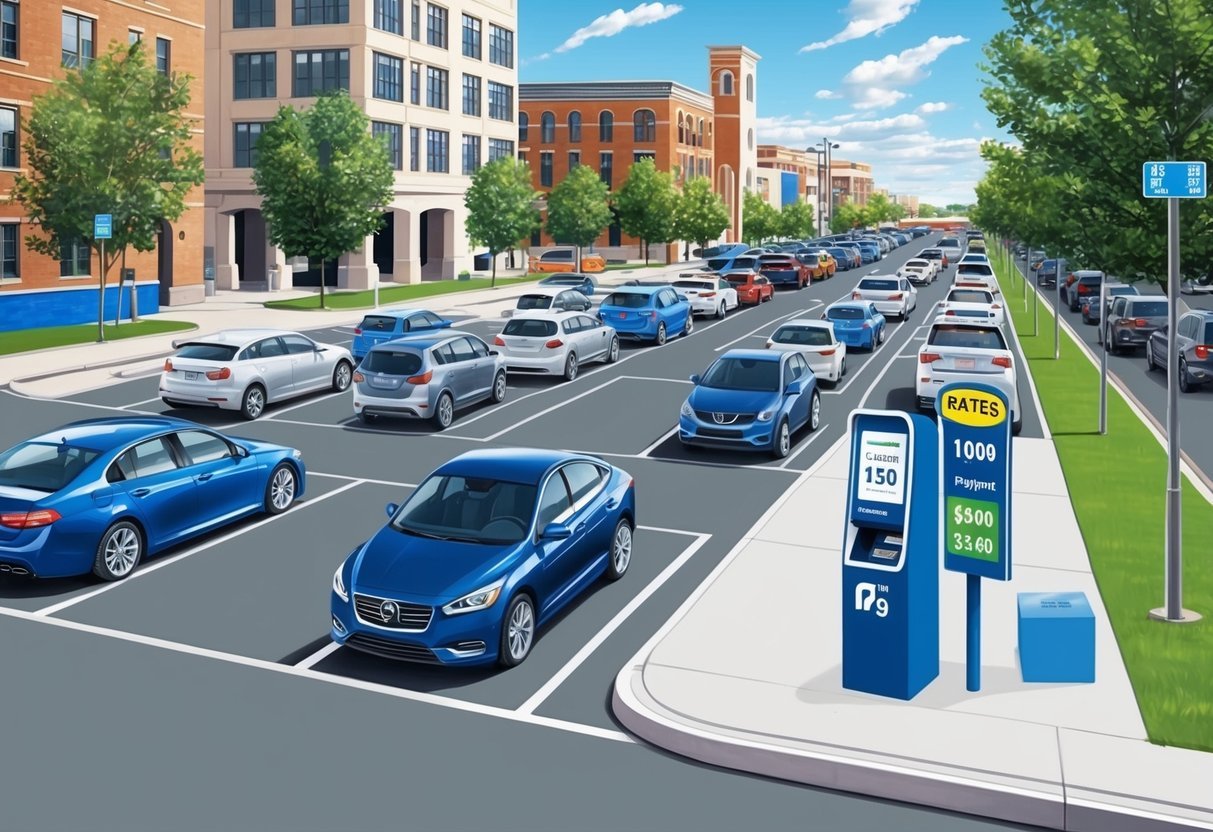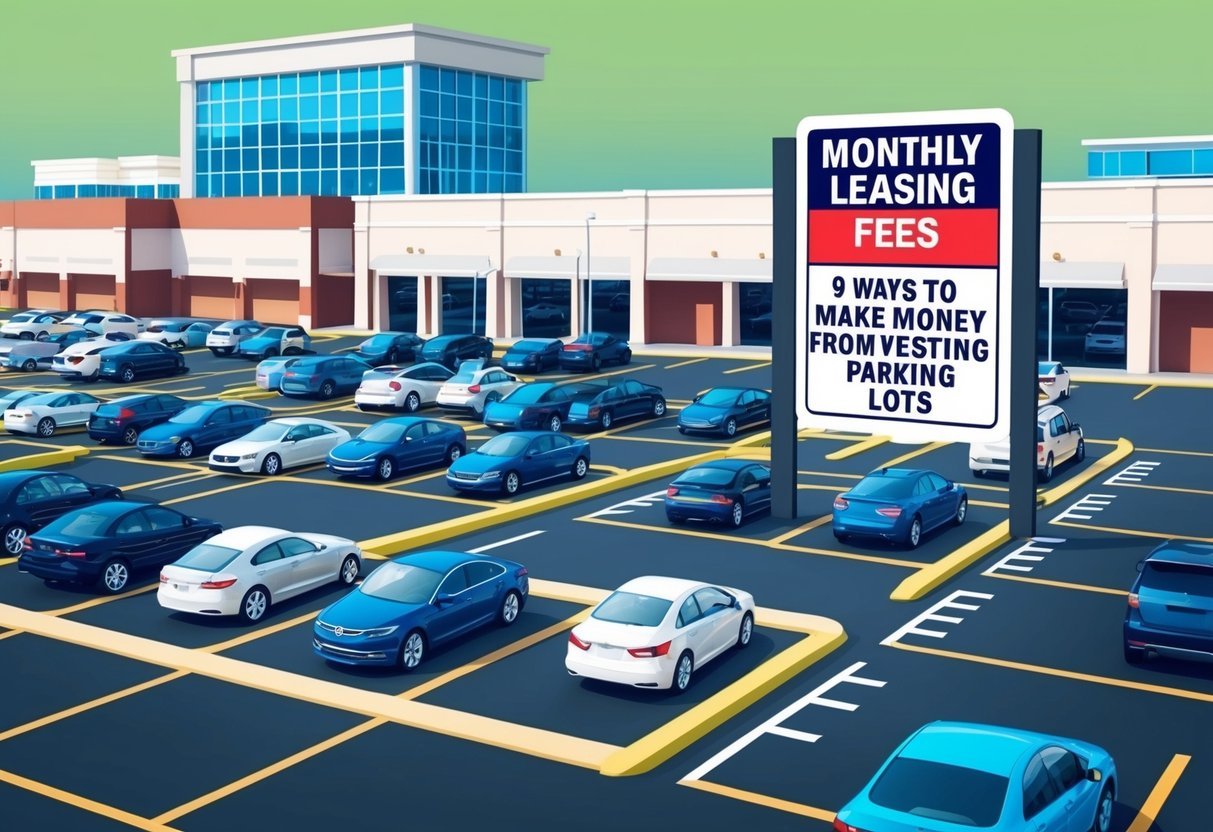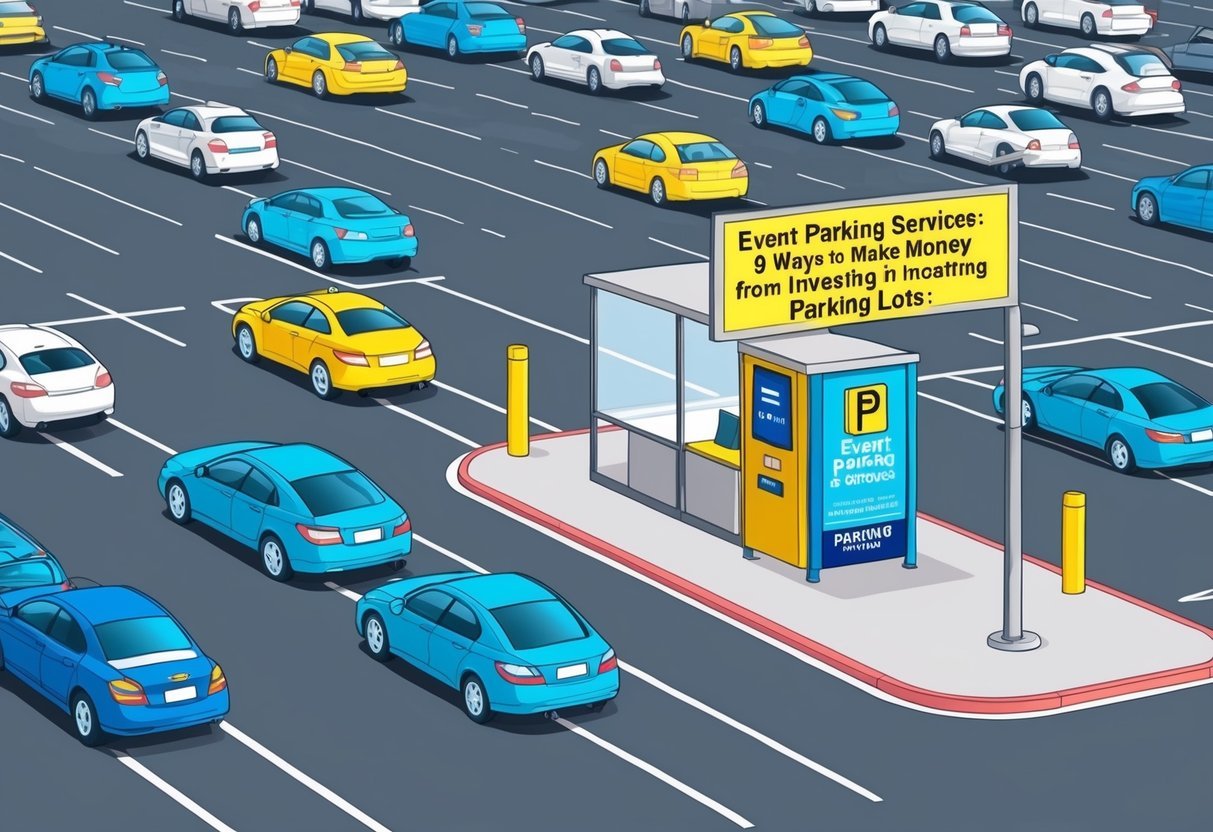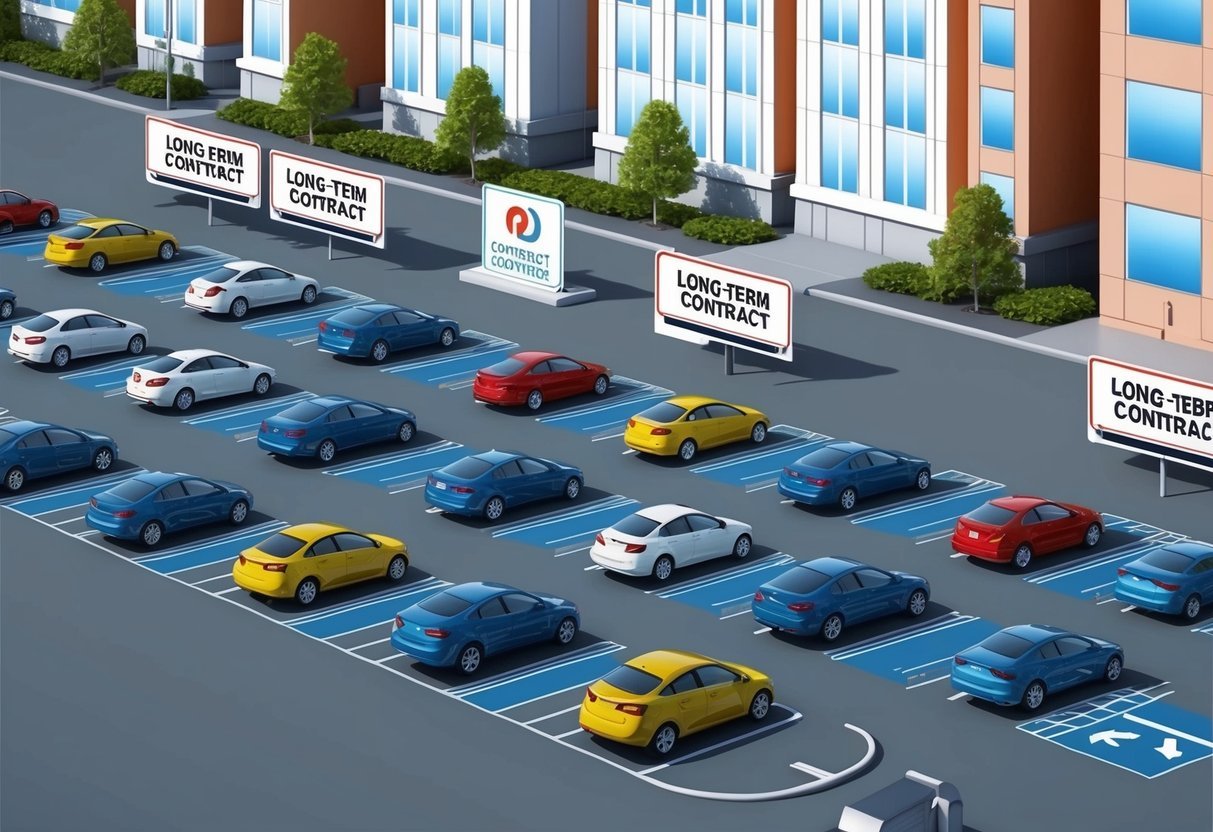Investing in parking lots presents a unique opportunity for those of us interested in real estate.
The promise of steady income and low maintenance makes it an attractive asset class.
With the continual growth of urban areas, the demand for parking is on the rise.
This offers an asset class that may often be overlooked.
Our goal is to uncover how smart investments in parking lots can yield impressive returns.

As we navigate this realm, we’ll explore the diverse strategies and approaches that enable successful ventures into this market.
From purchasing existing properties to innovatively managing parking spaces, there are numerous avenues to explore.
This article will guide us through the essentials of capitalizing on the growing need for parking solutions.
1) Monthly Leasing Fees

Monthly leasing fees can be a consistent way for us to generate income from parking lots.
This involves offering long-term leases to individuals or businesses who need regular parking access.
By entering into leasing arrangements, we can ensure a steady cash flow.
This provides financial stability even during periods of lower daily usage.
Securing leases with companies can be particularly advantageous.
Businesses often require several spots for employees and visitors, making them ideal long-term clients.
These contracts can also be negotiated to benefit both parties.
For example, we can offer discounted rates for volume or duration in exchange for a reliable income stream.
Residential areas near urban centers present excellent leasing opportunities.
Many residents may not have assigned parking, driving demand for leased spaces.
We find that these arrangements help in maintaining higher occupancy rates throughout the year.
It’s important for us to carefully evaluate local regulations and market conditions before setting rates.
Conducting a market analysis provides insights into competitive pricing.
This ensures we offer attractive yet profitable leasing options.
Additionally, well-maintained and secure lots often fetch higher leasing fees, emphasizing the need for regular upkeep.
We should consider leveraging technology to manage and optimize these leases efficiently.
Implementing a digital system for lease management simplifies operations and enhances tenant satisfaction.
This approach also allows us to track usage patterns and adjust our offerings accordingly, maximizing profitability.
Overall, monthly leasing fees offer a reliable and lucrative method for generating steady revenue from parking lot investments.
This strategy not only ensures consistent income but also strengthens long-term business relationships in our parking ventures, contributing to a sustainable business model.
2) Event Parking Services

Event parking services present a lucrative opportunity for us within the parking lot investment sector.
High-profile events, such as concerts, sports games, and festivals, generate a substantial influx of vehicles.
This creates a heightened demand for convenient parking solutions.
By positioning our parking lots strategically near event venues, we can charge premium rates for parking.
This increased demand during events allows us to maximize our profits.
On event days, we can also offer additional services, such as valet parking or shuttle services.
These can help to enhance customer experience and tap into further revenue streams.
Moreover, establishing partnerships with event organizers can provide a steady flow of customers.
We can negotiate a fixed rate for reserved spaces or propose special deals that draw attendees to our locations, ensuring regular and reliable income.
It’s important to ensure that our parking facilities are clean, well-lit, and efficiently managed to attract and retain customers.
Implementing technology solutions, like online booking systems or mobile payment options, can improve convenience and operational efficiency.
By focusing on event parking services, we can significantly increase our revenue while providing an essential service to event-goers.
It allows us to utilize existing infrastructure effectively, making the most of our investment in parking real estate.
3) Storage Solutions

One innovative way to increase revenue from parking lots is by offering storage solutions.
As urban spaces become more congested, people often seek convenient and secure storage options.
Our parking lots can be converted into sites for storage units or lockers, providing an additional income stream.
Implementing storage solutions is relatively straightforward.
By using existing structures or setting up prefabricated units, we can make effective use of unused parking spaces.
This option adds value to our investment, as it attracts a different type of customer base seeking flexibility in storage.
Security is a priority in storage solutions.
We need to ensure top-notch security features, including surveillance systems and secure access controls.
This not only protects the customers’ belongings but also enhances the overall reputation of our parking lot.
Operating storage units in a parking lot allows for the diversification of our investment portfolio.
By offering both parking and storage, we cater to a wider range of customer needs.
This dual approach helps stabilize income, especially in seasons or areas where parking demand may fluctuate.
We need to assess zoning laws and local regulations before proceeding.
Understanding the permissible uses of our parking lot will prevent any future legal complications and ensure compliance.
It’s essential to conduct market research to determine the level of demand for storage in our target area.
By providing well-maintained and secure storage options, we can distinguish our parking lot investments from others.
As an adaptable and versatile solution, this strategy adds a lucrative dimension to the conventional parking lot business.
4) Automated Parking Systems
Automated parking systems are at the forefront of modern innovations in the parking industry.
These systems make efficient use of space by mechanically handling the placement and retrieval of vehicles.
This advanced technology not only optimizes utilization but also enhances customer experience by reducing wait times.
Investing in these systems can lead to improved safety and reduced labor costs.
The automated systems incorporate sensors and cameras, which streamline operations and minimize the need for constant human oversight.
This helps in maintaining a high standard of service with fewer personnel.
The implementation of automated parking systems might involve significant upfront costs.
Equipment such as sensors, gateways, and dynamic display panels need to be considered when budgeting.
However, these investments can lead to long-term savings and increased revenue due to the enhanced efficiency and reduced labor costs.
The appeal of automated parking extends to urban areas where space is often at a premium.
By maximizing available space, these systems allow us to accommodate more vehicles in a given area.
This advantage could attract more users to our facilities, driving steady income from parking fees.
Partnerships with businesses that need parking solutions can enhance our returns.
By offering innovative and efficient parking services, we can create value for offices, residential complexes, and commercial centers.
In addition to income, this could establish our reputation as leaders in contemporary parking solutions.
Understanding the technological landscape and potential partnerships can be key to succeeding.
When deciding to invest, we should consider the location, expected demand, and specific needs of potential clients.
This strategic approach will enable us to make the most out of our investments in automated parking systems.
Long-term Contracts

In our venture into parking lot investments, long-term contracts play a crucial role.
These arrangements provide a stable, predictable income stream by leasing parking spaces for extended periods.
Businesses, government agencies, or residential complexes often seek these contracts to secure consistent parking for employees, vehicles, or residents.
Long-term contracts minimize turnover costs and reduce the effort spent on attracting new customers or lessees.
With these agreements in place, we can focus more on maintaining and enhancing the quality of our facilities.
This approach often results in improved customer satisfaction and increased loyalty over time.
Negotiating favorable terms is essential for maximizing the profitability of long-term contracts.
We must carefully consider factors like market rates, duration, and potential renewal clauses.
Crafting a contract that meets both parties’ needs ensures a mutually beneficial partnership that fosters trust.
Another advantage is the potential for developing strategic relationships with lessees.
By understanding their parking needs and preferences, we can offer tailored solutions that align with their requirements.
This personalization can lead to long-term partnerships and potential future opportunities.
Securing long-term contracts can also contribute to the valuation of our parking lot portfolio.
Consistent revenue streams make a property more attractive to potential buyers or investors.
This can be particularly advantageous if we decide to diversify or expand our investments.
One challenge we might face is the risk of market fluctuations.
Committing to lengthy contracts can sometimes lock us into rates that might become less favorable over time.
It’s crucial to include clauses that allow rate adjustments based on changing market conditions or inflation.
6) Valet Services
Valet services offer a unique revenue stream for parking lot investors.
By providing personalized service, we can enhance customer experiences while maximizing the use of our parking facilities.
Valet operations allow us to accommodate more vehicles in the same space, optimizing the lot’s capacity and profitability.
Implementing valet services can also elevate the perceived value of our property.
Customers are often willing to pay a premium for the convenience of having someone else park their vehicle.
This added value can be particularly appealing in areas with heavy traffic or limited parking.
We should consider location when introducing valet services.
High-traffic areas such as city centers, event venues, or upscale dining establishments can provide ideal opportunities.
The demand for such services often correlates with the scarcity and demand for parking spaces in these regions.
Managing a valet service involves handling logistics efficiently.
Hiring a well-trained team that can operate smoothly and maintain customer satisfaction is critical.
Ensuring that our staff is professional and courteous will reflect positively on our business.
Insurance and liability are essential elements to address in this business model.
Adequate coverage protects our investment and assures our clientele of a responsible operation.
This builds trust and can lead to repeat business and referrals.
Valet services can also serve as a marketing tool for our parking lot.
By forming partnerships with local businesses like restaurants, theaters, or hotels, we can increase visibility and drive more traffic to our location.
As a result, this can create additional steady streams of income.
7) Advertising Space Rental

When we manage parking lots, we find that renting out advertising space is a valuable way to increase income.
High-traffic areas offer businesses excellent opportunities to capture the attention of both drivers and pedestrians.
Consequently, advertisers are willing to pay for billboard or signage placements in these locations.
We can maximize our earnings by identifying prime spots within our lots.
Carefully selecting positions that ensure maximum visibility can significantly enhance the value of our advertising space.
It’s important for us to maintain clear and attractive areas to maximize potential revenue.
Managing advertising space effectively involves building relationships with local businesses and marketing agencies.
We can provide them with unique branding opportunities that allow them to reach large, diverse audiences.
By collaborating with partners, we can maintain a steady stream of income from advertising rental fees.
Incorporating digital advertising into our parking lots can also be a smart move.
Dynamic displays have the advantage of running multiple ads in a continuous loop, offering more slots to sell.
As technology advances, our digital signage may also appeal to tech-savvy advertisers looking for innovative advertising solutions.
Finally, setting reasonable rental rates is essential for attracting advertisers while maintaining competitiveness.
We should consider the size, visibility, and location of the advertising space to determine fair pricing.
By keeping our clients’ needs in mind and regularly assessing market conditions, we can ensure our offerings remain attractive.
8) Loyalty Programs

Offering a loyalty program can significantly enhance our parking lot investment strategy.
By rewarding customers for frequent visits, we create an attractive incentive for them to return.
This not only increases repeat business but also builds a dedicated customer base.
Our loyalty program can be customized with various incentives.
These might include free parking after a set number of visits, discounted rates for members, or perks such as priority parking spots.
Tailoring these rewards to our customers’ preferences ensures they feel valued and appreciated.
Another advantage of loyalty programs is the valuable data they provide.
By tracking customer behavior, we gain insights into peak parking times and popular services.
This information helps optimize operations and identify areas for further improvement.
It’s essential to maintain simplicity in our loyalty program.
Clear terms and quick registration can lead to higher participation rates.
Customers will likely engage if they easily understand how to earn and redeem rewards.
Implementing technology, such as mobile apps or digital kiosks, can streamline the process.
Digital platforms make it convenient for customers to track their progress and access rewards, enhancing their overall experience with us.
By consistently promoting our loyalty program, we keep it top of mind for our customers.
Regular communication through email campaigns or on-site signage ensures they are aware of the benefits they can enjoy by choosing us.
Emphasizing the value they gain nurtures long-term relationships.
9) Concert and Festival Parking

In the world of parking lot investments, event-specific parking for concerts and festivals offers unique opportunities.
These events often draw large crowds, creating a temporary surge in demand for parking spaces.
By strategically placing parking lots near popular concert venues or festival locations, we can capitalize on these increased traffic volumes.
Many concert-goers prefer the convenience of parking close to the event site, as it allows them to save time and avoid the hassle of finding a spot in overcrowded standard parking areas.
We can implement dynamic pricing models, raising rates during event times to reflect the higher demand.
Partnering with event organizers can further enhance our investment.
By coordinating with them, we might secure exclusive parking rights or offer packages that include parking as part of the event ticket.
This collaboration can increase our visibility and potential customer base.
We should consider the infrastructure needed to manage these events.
Efficient traffic flow, clear signage, and dedicated staff for direction and assistance are essential to accommodate the influx of vehicles.
Investing in technologies like mobile payment systems or online reservations can streamline operations and enhance customer satisfaction.
It’s crucial to conduct thorough research to identify areas with frequent events and potential parking shortages.
This helps ensure that our investment is strategically positioned to maximize returns.
Additionally, obtaining any necessary permits or clearances well in advance is important to avoid any operational issues during events.
Engaging with local businesses can provide mutual benefits, such as partnerships that offer concert-goers discounts or promotions.
This can increase our parking lot’s appeal and encourage repeat visitation.
Maintaining strong community relationships further solidifies our presence and reputation in the area.
Fundamentals of Investing in Parking Lots

Investing in parking lots offers potential for high returns.
Understanding the reasons for investing and the demand in this market is crucial to achieving success.
Why Invest in Parking Lots?
Parking lots represent a unique real estate niche.
Their appeal lies in low maintenance costs and consistent revenue.
As cities expand, parking demand grows, ensuring a reliable income stream. Diversification is another advantage, as parking lots behave differently from other real estate, offering protection against economic downturns.
With rising urbanization, parking space is increasingly scarce. Strategic locations, such as near airports or shopping centers, maximize profits.
Our approach focuses on recognizing high-demand areas and analyzing factors like price trends and demographic changes.
Understanding Market Demand for Parking
Demand for parking fluctuates with urban growth. Population increase and vehicle ownership drive this demand.
Understanding these dynamics helps us make informed investment decisions.
Identifying areas with limited parking options or anticipated expansion can lead to lucrative opportunities.
Monitoring local legislation on parking requirements provides insights into future market trends.
In some cities, changes in zoning laws could increase the need for private parking spaces.
By focusing on these factors, we can better align our strategies with market realities.
Financial Considerations
When investing in parking lots, understanding the financial landscape is crucial to success.
Key areas to focus on include evaluating the costs and potential returns, as well as exploring different funding and financing avenues available for such investments.
Cost Analysis and ROI
Investing in parking lots requires careful analysis of costs versus potential returns. Initial costs include purchasing the land or facility, construction, and any necessary permits.
Generally, parking lots can offer a high return on investment (ROI) due to their relatively low operating costs.
Maintenance expenses typically involve cleaning, security, and periodic resurfacing.
We must evaluate local market conditions, as ROI varies with location and demand. Our goal is to identify trends that may indicate rising demand due to population growth or development of nearby attractions or businesses.
Funding and Financing Options
Several funding options exist for parking lot investments. Traditional loans from banks are common, often requiring a substantial down payment and a solid credit history. Alternative financing methods, such as urban development grants or syndicated investor groups, might also be viable, offering flexibility in terms and conditions.
Specialized investment funds focusing on real estate and parking facilities can help diversify and reduce risk.
Additionally, our ability to leverage partnerships may provide better access to larger or more competitive markets.
Understanding these options allows us to choose the best path for financing our parking lot investments efficiently.
Legal and Regulatory Aspects
When investing in parking lots, understanding local zoning laws and environmental regulations is crucial.
These factors can significantly impact the feasibility and profitability of your investment.
Zoning Laws and Permits
Zoning laws dictate how land can be used and are essential in determining the viability of a parking lot investment.
We must ensure that the area we are considering allows for commercial parking operations.
If not, rezoning may become necessary, requiring significant time and effort.
Moreover, obtaining necessary permits is crucial.
These may include building permits, occupancy certificates, and possibly special business licenses. Neglecting these requirements can lead to fines or even the closure of our parking facility.
Staying informed and compliant helps us avoid potential legal issues that could affect profitability.
Compliance with Environmental Regulations
Parking lots must comply with various environmental standards to minimize negative impacts.
Stormwater management is a key consideration since excessive runoff can lead to pollution.
We should integrate permeable surfaces or proper drainage systems to manage this effectively.
Furthermore, some regions require green spaces or landscaping to mitigate the heat island effect.
Compliance not only helps in meeting regulations but also enhances the attractiveness and appeal of our parking lot. Regular audits and staying updated with changing regulations can help us maintain compliance and ensure our operations run smoothly.
Frequently Asked Questions
In this section, we address common inquiries regarding parking lot investments.
We’ll explore how to get started, identify potential revenue streams, and consider factors that impact overall profitability.
How can one start investing in parking lots?
Entering the parking lot investment market involves several steps.
Initially, it’s important to conduct thorough market research to identify promising locations.
From there, potential investors need to assess the capital requirements needed for purchase and initial setup.
It may also be beneficial to connect with industry professionals for guidance and partnership opportunities.
What are common revenue streams for parking lot investments?
Parking lots can offer diverse revenue opportunities.
Monthly leasing fees provide a consistent income source, while event parking services cater to temporary high-demand occasions.
Additional services, such as offering storage solutions or leveraging automated parking systems, can enhance revenue potential.
Investors should also consider long-term contracts with businesses or institutions to secure recurring income.
What factors contribute to the profitability of a parking lot?
Several elements can affect a parking lot’s profitability.
The demand in the location is a primary factor, as high-traffic areas usually yield higher returns.
Competitive pricing and efficient management also play a crucial role.
Furthermore, adopting new strategies for customer convenience, such as technology integration, can improve profitability.
What are the typical operating expenses associated with running a parking lot?
Operating a parking lot involves multiple expenses.
Maintenance costs, such as repairing pavements and maintaining signage, are essential for smooth operations.
Security measures, including surveillance and lighting, might incur additional costs.
Moreover, automated systems used for payment collection may require periodic updates and servicing to ensure their efficiency.
How does location affect the success of a parking lot investment?
The location significantly influences a parking lot’s success.
Urban business districts and tourist-heavy areas tend to see higher demand, resulting in increased profitability.
Accessibility and visibility from major roads can also enhance the appeal of a parking lot.
Carefully assessing a location’s potential is a key step in the investment process.
What strategies can be implemented to enhance parking lot revenues?
To boost revenues, consider innovative strategies.
Implementing automated payment systems can enhance the customer experience and improve efficiency.
Offering premium services, such as valet or car wash facilities, can attract more customers.
Additionally, creating partnerships with local businesses and hosting events at peak times can maximize utilization and drive revenue growth.

